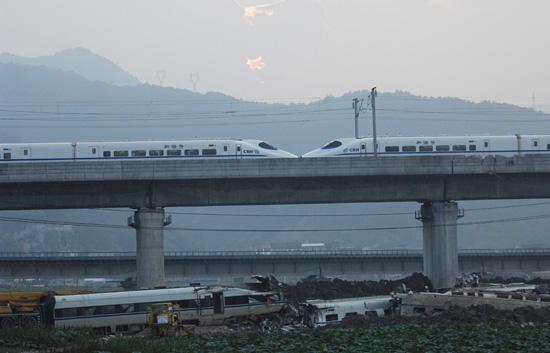
Two trains pass through the collision site Monday evening. The traffic resumed Monday morning after two trains collided near Wenzhou City of east China's Zhejiang Province on July 23. At least 39 people were killed and 192 were injured in the accident. [Xinhua]
China's deadly bullet train crash affected capital markets on Monday as analysts agreed Saturday's accident, the worst since 2008, will seriously undermine confidence in the country's high-speed railway ambitions.
A high-speed express rear-ended another bullet train that had lost power following a lightning strike near Wenzhou City, Zhejiang Province, killing at least 39 people and injuring about 200.
Yesterday, many of the 32 railway-related shares listed on the Chinese mainland's markets were either forced to suspend trading amid panic selling or saw their stock price plunge by the daily cap of 10 percent.
Although China hasn't yet released a full report to explain the cause of the accident, companies that provide electrical and control systems to the railways were condemned by investors after a 20-character statement released by the Ministry of Railways said signaling operations were to blame.
Beijing Century Real Technology Co and Beijing Jiaxun Feihong Electrical - two companies that dominate the industry - yesterday asked for trading to be suspended.
Beijing Century, which landed in ChiNext, China's Nasdaq-style board, in December, relies heavily on Ministry of Railways business. Its first-quarter earnings report showed 91 percent of revenue was from selling monitoring systems to railway operators.
The company, a producer of power monitoring, optical cable online monitoring, integrated video surveillance and disaster prevention systems, has seen its products installed in more than 400 railway safety control projects since it was established in 1999.
Its video surveillance has been installed on six passenger railway lines, including the Ningbo-Wenzhou Line, on the route where Saturday's crash occurred.
But Beijing Century denied that it had anything to do with the accident, as its products only monitor the situation inside a train control room, the Oriental Morning Post reported yesterday, citing an unnamed person in the company's sales department.
He said the company's products can be compared to traffic lights, as they "provide information based upon which people make a decision, but cannot prevent people from running red lights."
In the prospectus of Shenzhen-listed Henan Splendor Science & Technology Co, a rival of Beijing Century, it admitted that China's research ability in terms of communications and control systems on high-speed railways "still lags behind foreign countries."
Henan Splendor was suspended from trading before the accident due to an assets reorganization plan.
Beijing Century shares have tumbled nearly 40 percent this year, while Henan Splendor's price has fallen almost 63 percent in the same period.
Beijing Jiaxun boasts on its website that its equipment is installed in all 18 railway bureaus across the country. Jiaxun shares have slumped almost 13 percent so far this year.
Shares in China Railway Group Co, the company that built the tracks upon which the crash occurred, yesterday fell 5.7 percent to 3.63 yuan.
The major railway constructor said in its first quarter earnings report that its cashflow from operational activities in the first three months was in the red to the tune of nearly 2.2 billion yuan (US$342 million).
And new deals sealed in the first quarter declined by 39 percent after China cut its rail investment target from 3.5 trillion yuan to 2.8 trillion yuan over the next five years.
China Railway Group has lost almost 19 percent of its value this year.
Shares in CSR Corp, the builder of the crashed trains, fell 8.9 percent to 6.04 yuan. CSR owed 7.1 billion yuan at the end of the first quarter, according to its reports. Its share value has tumbled 27 percent so far this year.





